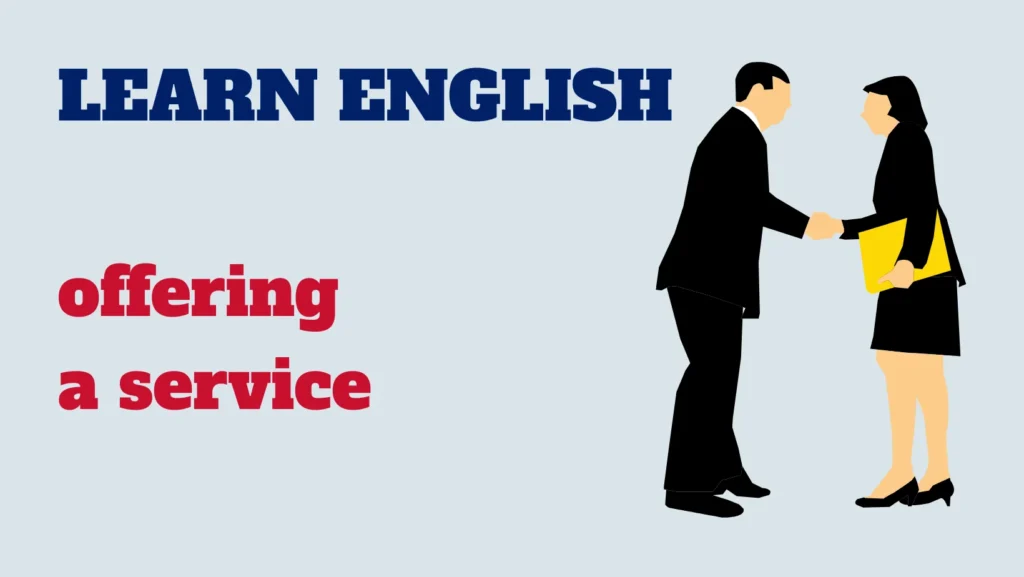When learning a new language, it’s important to master common expressions for effective communication. If you want to offer your services in English, whether in a professional or personal context, there are several useful expressions to know.

In this lesson, we’ll explore various ways to offer a service in English, providing concrete examples to help you feel more comfortable in your interactions.
Basic expressions:
“Can I help you?”
A polite and straightforward way to offer assistance.
“I’m at your disposal if you need help.”
Shows your availability to help without imposing.
“May I offer you my assistance?”
A formal way to offer help.
Specific service offers:
“If you need technical assistance, feel free to let me know.”
Offers support in a specific area.
“I can help you with writing your CV if you’d like.”
Provides assistance with a particular task.
“If you’re looking for someone to translate this document, I’m here to help.”
Offers assistance for a specific skill.
Polite formulations:
“Would it be possible for me to assist you?”
A polite way to offer help.
“If you don’t mind, I’d like to offer my assistance.”
Requests permission to offer help politely.
“I would be honored to provide you with my help if you wish.”
Expresses willingness to help with respect.
Friendly expressions:
“Hey, if you need a hand, I’m here!”
A friendly and informal offer of help.
“Need a little help? I’m your person!”
Casual and friendly way to offer assistance.
“Feel free to ask me for help; that’s what friends are for!”
Encourages reaching out for help in a friendly manner.
Offering a commercial service:
“Our company provides marketing consulting services. Are you interested?”
A business-oriented way to propose services.
“If you’re in need of professional cleaning services, we’re here to help.”
Commercial service offer for a specific need.
“Would you like to learn more about our custom web development services?”
Invites interest in a specific business service.
Responding to a service request:
“Certainly, I would be delighted to help you!”
Acceptance with enthusiasm.
“It’s my pleasure to offer my assistance.”
Polite acknowledgment of the request.
“Absolutely, count on me to provide the service you need.”
Assures the person that their needs will be met.
Accepting a service offer:
“Thank you, that’s very kind of you! I really appreciate your offer.”
Expresses gratitude for the offered help.
“I appreciate it; I gladly accept your offer.”
Acknowledges appreciation and acceptance.
“That’s exactly what I needed. Thank you so much!”
Expresses gratitude for the offered assistance.
“Your help would be greatly appreciated. Thanks for reaching out.”
Recognizes the value of the offered help.
“I’m truly grateful for your offer. I accept it with gratitude.”
Emphasizes gratitude while accepting the help.
Declining a service offer:
“Thank you sincerely for your offer, but I think I can manage this myself.”
Politely declines while expressing confidence.
“It’s very kind of you to offer your help, but I’ll try to handle this issue on my own.”
Appreciates the offer but prefers independent handling.
“Thank you very much for your offer, but I prefer to take care of this situation.”
Politely declines while expressing a personal preference.
“Your proposal is truly appreciated, but I’ll try to resolve this issue on my own.”
Acknowledges the offer but opts for an independent solution.
“I’m thankful for your offered help, but I’ll try to handle this matter differently.”
Expresses gratitude but declines while suggesting an alternative approach.
Requesting more information:
“Before deciding, could you provide more details about the specifics of your offer?”
Seeks additional information before making a decision.
“I’m interested, but could you give me more details about what this would involve?”
Requests more information about the offer.
“Thank you for this offer. Would it be possible to have more information before I decide?”
Politely asks for more details to make an informed decision.
“I’m curious to learn more about your offer. Could you share more details?”
Expresses curiosity and asks for additional information.
“Before making a decision, could you provide some clarity on how this would work?”
Asks for details to better understand the offer.
Offering a service in English may seem daunting at first, but with these expressions at your disposal, you’ll be able to communicate effectively and politely. Practice these expressions in real-life situations with friends, colleagues, or clients. The key is to adapt to the context and the relationship with the person to whom you’re offering your service.



